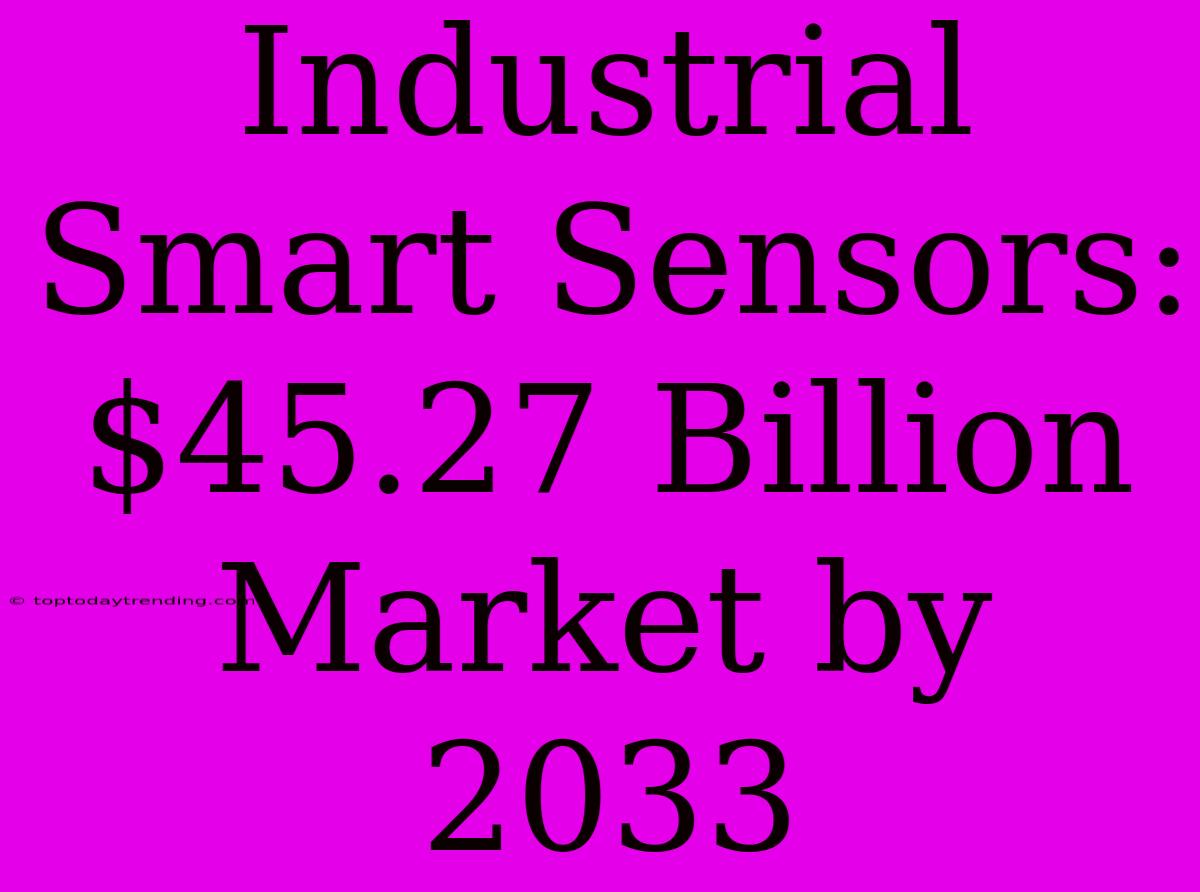Industrial Smart Sensors: $45.27 Billion Market by 2033 - A Comprehensive Analysis
The industrial sector is undergoing a digital transformation, driven by the rise of Industry 4.0 and the Internet of Things (IoT). At the heart of this transformation are industrial smart sensors, devices that gather real-time data about critical operating parameters and transmit it to centralized systems for analysis and decision-making. This data-driven approach enables businesses to optimize processes, improve efficiency, reduce downtime, and enhance safety.
The market for industrial smart sensors is booming. According to a recent report by Allied Market Research, the global industrial smart sensor market is projected to reach $45.27 billion by 2033, growing at a CAGR of 9.8% from 2023 to 2033. This growth is fueled by several factors:
Key Drivers for Growth:
- Increasing adoption of Industry 4.0 and IoT: As more industries embrace digitalization, the demand for smart sensors to capture real-time data and enable connected operations is increasing.
- Growing need for predictive maintenance: Smart sensors provide valuable insights into equipment health, enabling proactive maintenance and preventing costly breakdowns.
- Rising focus on process optimization: Smart sensors help businesses optimize production processes, reduce waste, and improve resource utilization, leading to enhanced productivity and profitability.
- Government initiatives promoting smart manufacturing: Various governments are implementing policies and incentives to encourage the adoption of smart technologies, including smart sensors, in their respective industrial sectors.
- Advancements in sensor technology: Innovations in sensor technologies, such as miniaturization, increased accuracy, and improved connectivity, are expanding the capabilities and applications of industrial smart sensors.
Key Applications of Industrial Smart Sensors:
- Process Monitoring and Control: Sensors track key parameters like temperature, pressure, flow, and vibration in manufacturing processes, enabling real-time adjustments for optimal performance.
- Predictive Maintenance: Sensors monitor equipment health and detect anomalies, alerting operators to potential issues before they lead to breakdowns, minimizing downtime and maintenance costs.
- Asset Tracking and Management: Sensors track the location, condition, and usage of assets, enabling efficient inventory management and logistics optimization.
- Safety and Security: Sensors detect hazards and security breaches, providing real-time alerts and enabling rapid response to emergencies.
- Environmental Monitoring: Sensors monitor air, water, and soil quality, providing valuable data for environmental protection and compliance.
Market Segmentation and Trends:
The industrial smart sensor market is segmented based on sensor type, technology, application, and end-user industry.
- Sensor Types: Common types include pressure sensors, temperature sensors, proximity sensors, flow sensors, and vibration sensors.
- Technologies: The market includes a wide range of sensor technologies, including wireless, wired, optical, ultrasonic, and magnetic sensors.
- Applications: As mentioned earlier, industrial smart sensors are used in a diverse range of applications, including process monitoring, predictive maintenance, asset tracking, safety and security, and environmental monitoring.
- End-user Industries: Key end-user industries include manufacturing, energy, automotive, aerospace, healthcare, and agriculture.
Trends in the Industrial Smart Sensor Market:
- Growing adoption of wireless sensors: Wireless sensors offer flexibility, ease of installation, and cost-effectiveness, driving their adoption in various applications.
- Increasing demand for intelligent sensors: Sensors with advanced capabilities, such as data processing, self-calibration, and communication protocols, are gaining traction.
- Integration of artificial intelligence (AI) and machine learning (ML): AI and ML are being used to analyze sensor data, provide predictive insights, and optimize system performance.
- Cloud-based sensor platforms: Cloud platforms provide data storage, analytics, and visualization capabilities, enhancing the value of sensor data.
Challenges and Opportunities:
While the industrial smart sensor market is poised for significant growth, several challenges remain.
- Interoperability issues: Lack of standardization and compatibility between different sensor technologies and platforms can hinder seamless integration and data exchange.
- Data security concerns: Ensuring the security of sensitive data collected by sensors is crucial, especially in critical infrastructure and industrial environments.
- Complexity of implementation: Implementing and integrating smart sensor systems can be complex and require specialized expertise.
- High initial investment: The cost of deploying smart sensor networks can be significant, especially for large-scale industrial applications.
Despite these challenges, the industrial smart sensor market presents exciting opportunities for businesses to innovate and thrive. By addressing these challenges through collaboration, technological advancements, and strategic investments, stakeholders can unlock the full potential of smart sensors and drive the digital transformation of the industrial sector.
Conclusion:
Industrial smart sensors are playing a pivotal role in the digital transformation of industry. Their ability to collect real-time data, provide actionable insights, and optimize processes is revolutionizing manufacturing, logistics, safety, and sustainability. The market is expected to grow significantly in the coming years, driven by the increasing adoption of Industry 4.0, IoT, and advanced technologies. By embracing these trends and addressing the challenges, companies can capitalize on the opportunities presented by this dynamic market and unlock a new era of industrial efficiency and innovation.

